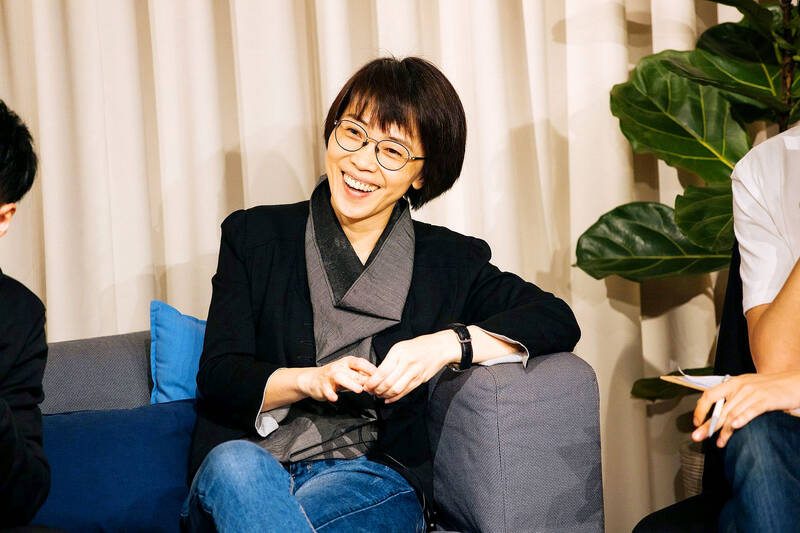Taiwanese director Zero Chou (周美玲) received the Honorary Award on Monday at the 2025 Zinegoak LGBTIQ+ Film and Performing Arts Festival in Bilbao, Spain.
Alaitz Arenzana Letamendi, director of the festival, said Chou’s work has enriched Taiwanese cinema and encouraged filmmakers and queer rights activists around the world.
The award honors Chou’s “courage, talent and tireless dedication to creating films that challenge boundaries, break stereotypes and promote a more just and inclusive world,” the festival’s organizers said in an introductory article.

Photo courtesy of Swallow Wings Films
“Her work is an example of how art can be a powerful tool for social transformation and a mirror of our deepest aspirations,” the article added.
As Chou was unable to attend the ceremony due to health issues, her partner of more than 20 years, Hoho Liu (劉芸后), accepted the award on her behalf.
Reading Chou’s pre-written acceptance speech, Liu said the two had been involved in the gay rights movement through film, telling one queer story after another in various formats and reaching audiences in other Asian cities.

Photo courtesy of Activator Marketing Co
Chou added that the award belonged not only to her, but also to Liu.
The festival held a retrospective exhibition of Chou’s work from Monday to Wednesday, featuring her films Spider Lilies (刺青), Splendid Float (豔光四射歌舞團) and Drifting Flowers (漂浪青春).
Liu was surprised after a screening of Spider Lilies when a local film enthusiast approached her and said he had watched all their works and was moved to tears by the film. She expressed hope that future creators will continue to make profound queer films.

Photo courtesy of Harvest Production Films co
In an online interview, a much-recovered Chou said she was grateful for the festival’s recognition.
“I thank them for seeing Taiwan’s efforts on gay rights,” she said.
Chou said the festival screened some of her earliest works, through which audiences could trace her artistic evolution.
She added that it was an honor to have her films shown again, “introducing the world to the Taiwanese gay community’s quiet but graceful struggle to survive.”
Chou said that although Taiwan became the first Asian country to legalize same-sex marriage in 2019, it does not mean the world has become a safe place. “Actions must continue to protect the safe spaces we need,” she added.
“We will continue filming,” she said.
Chou won Best Taiwanese Film at the 2004 Golden Horse Awards for Splendid Float and Best Feature Film at the 2007 Teddy Awards — an official Berlinale prize for films with LGBTQ themes for Spider Lilies. She also received the Lesbianism and Gender Award at the 2009 Zinegoak festival for Drifting Flowers and the Honorary Golden Cyclo at the 2024 Vesoul International Festival of Asian Cinema for Untold Herstory (流麻溝十五號).
Zinegoak, the International GayLesboTrans Film and Performing Arts Festival in Bilbao, was established in 2004 and has become a benchmark of LGBT festivals internationally, according to its official Web site.
Zinegoak 2025 will take place from June 23 to 30.

June 23 to June 29 After capturing the walled city of Hsinchu on June 22, 1895, the Japanese hoped to quickly push south and seize control of Taiwan’s entire west coast — but their advance was stalled for more than a month. Not only did local Hakka fighters continue to cause them headaches, resistance forces even attempted to retake the city three times. “We had planned to occupy Anping (Tainan) and Takao (Kaohsiung) as soon as possible, but ever since we took Hsinchu, nearby bandits proclaiming to be ‘righteous people’ (義民) have been destroying train tracks and electrical cables, and gathering in villages

This year will go down in the history books. Taiwan faces enormous turmoil and uncertainty in the coming months. Which political parties are in a good position to handle big changes? All of the main parties are beset with challenges. Taking stock, this column examined the Taiwan People’s Party (TPP) (“Huang Kuo-chang’s choking the life out of the TPP,” May 28, page 12), the Democratic Progressive Party (DPP) (“Challenges amid choppy waters for the DPP,” June 14, page 12) and the Chinese Nationalist Party (KMT) (“KMT struggles to seize opportunities as ‘interesting times’ loom,” June 20, page 11). Times like these can

Dr. Y. Tony Yang, Associate Dean of Health Policy and Population Science at George Washington University, argued last week in a piece for the Taipei Times about former president Ma Ying-jeou (馬英九) leading a student delegation to the People’s Republic of China (PRC) that, “The real question is not whether Ma’s visit helps or hurts Taiwan — it is why Taiwan lacks a sophisticated, multi-track approach to one of the most complex geopolitical relationships in the world” (“Ma’s Visit, DPP’s Blind Spot,” June 18, page 8). Yang contends that the Democratic Progressive Party (DPP) has a blind spot: “By treating any

Swooping low over the banks of a Nile River tributary, an aid flight run by retired American military officers released a stream of food-stuffed sacks over a town emptied by fighting in South Sudan, a country wracked by conflict. Last week’s air drop was the latest in a controversial development — private contracting firms led by former US intelligence officers and military veterans delivering aid to some of the world’s deadliest conflict zones, in operations organized with governments that are combatants in the conflicts. The moves are roiling the global aid community, which warns of a more militarized, politicized and profit-seeking trend